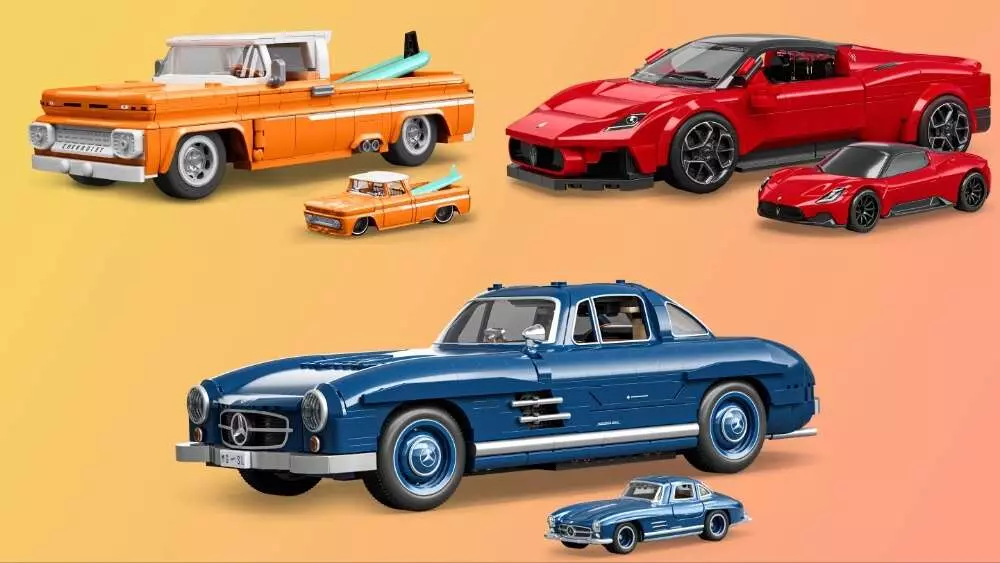Mattel, a titan in the toy industry, is branching into the building set realm with its new brand, Brick Shop, set to launch this summer. This initiative marks an exciting new venture for the company, which already owns Mega Bloks—its answer to competitors like Lego. The strategic choice to kick off Brick Shop with their iconic Hot Wheels franchise is a testament to the brand’s dedication to appealing to enthusiasts rather than just casual builders. This endeavor represents a paradigm shift where collectible pieces come to life through construction, allowing fans with a penchant for automotive history and design to engage in a tactile experience that merges play with passion.
A Collector’s Dream: Authenticity and Customization
What sets Brick Shop apart in a saturated market is its focus on authenticity and customization tailored for collectors and car aficionados. The decision to include models of automotive legends like the Mercedes-Benz 300 SL and Corvette Grand Sport in their lineup is not merely a nod to nostalgia but a shrewd acknowledgment of their target demographic. With three distinct series catering to different levels of engagement—from entry-level models to high-end collectibles—Mattel captures a wide audience. The Speed Series, at a reasonable price point of $20, serves as an accessible entryway for younger builders or those new to model building. However, it is the Elite and Premium Series that promise a more sophisticated building experience with enhanced detail and increased authenticity, calling to those who seek to display their masterpieces.
Unveiling the Series: What to Expect
The Brick Shop’s initial offering includes seven meticulously crafted Hot Wheels sets, each bundled with a complementary 1:64 diecast metal car, further elevating the collector’s value. For example, the Premium Series is headlined by the stunning Mercedes-Benz 300 SL, a model that boasts intricate details, from the iconic gullwing doors to authentic interior features. This is more than just a building kit; it’s an investment in automotive artistry, merging the playful nature of toys with the elegance found in true car culture.
Meanwhile, the Elite Series kits, featuring models like the Acura NSX and Corvette Grand Sport, introduce functional components, such as working steering wheels and swappable parts. This allows builders to personalize their creations, embodying the spirit of the original vehicles. The inclusion of metal components not only adds to the authenticity but also enhances the tactile experience—transforming mere assembly into an artistic endeavor.
Shaping an Immersive Experience
In this digital age, where many kids gravitate towards screens, Mattel’s strategic initiative to reinvigorate interest in physical play through Brick Shop is commendable. By blending nostalgia with modern building techniques, they remind collectors and new enthusiasts alike of the tactile joy of constructing model cars. The focus isn’t merely on play; it’s about creating an immersive experience that resonates with the universal love for automobiles. The intersection between craftsmanship and automotive design nurtures a bond between the builder and the beloved vehicles they represent.
Moreover, the meticulous detail involved in the Brick Shop sets embodies a sense of respect for automotive history. As builders piece together their replicas, they become part of a larger narrative—transforming each kit into a homage to these incredible machines and the legacy they carry.
The Economic Landscape and Brand Loyalty
Launching Brick Shop in a competitive market necessitates a careful balance of price and perceived value. Offering three tiers of pricing secures a broader consumer base while establishing brand loyalty among consumers who may evolve from the more accessible Speed Series to the refined premium offerings. The structure is not just a sales strategy; it cultivates a culture of collecting, where each new release sparks excitement and encourages builders to gather their favorite models as part of a growing legacy.
Mattel’s decision to cater to the collector’s market through Brick Shop also signals an awareness of shifting consumer habits. As enthusiasts swipe through their screens to purchase collectibles, integrating online pre-order opportunities with attractive marketing can pave the way for success.
This keen understanding of the ecosystem surrounding model kits suggests that Mattel is not just launching another building set; they are launching a community, a shared passion for automotive art that invites builders to connect over their love for cars. As Brick Shop unfolds this summer, it undoubtedly ignites excitement among both seasoned collectors and aspiring builders alike, ramping up for a race into the world of creative assembly.

